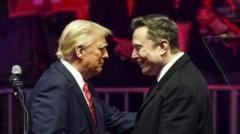Since his appointment as head of the new Department of Government Efficiency, Elon Musk has swiftly moved to reshape federal operations, particularly targeting USAID while generating unease among employees and legal experts alike about the implications of his unilateral actions.
Musk's Unexpected Role in Trump's Administration: Reshaping USAID and Federal Agencies

Musk's Unexpected Role in Trump's Administration: Reshaping USAID and Federal Agencies
Elon Musk’s takeover at the Department of Government Efficiency raises alarm bells within the federal workforce as he pushes through significant reforms and faces backlash over his authoritarian tactics.
The introduction of Elon Musk to the political arena as a key player in Donald Trump's second administration has caused a ripple of both excitement and trepidation. Musk, the world's richest man, recently clarified his unofficial title via social media as “Tech Support,” downplaying the extensive changes he has been facilitating within Washington. As head of the newly formed Department of Government Efficiency (Doge), he has initiated several aggressive reforms in a short time frame, including access to the federal payment system, agency dismantling, and extreme measures towards government personnel.
His shift from being a Democrat to a staunch Republican supporter is notable. Initially backing Florida Governor Ron DeSantis, Musk pivoted to become a primary booster for Trump, donating approximately $288 million to Trump's campaign and allied candidates. Within weeks of Trump's inauguration, Musk found himself closely aligned with Trump, a position that has evolved into significant influence within the administration.
Trump appointed Musk to Doge, a role that has seemingly allowed Musk to wield considerable power over the restructuring of federal agencies. Reports indicate that Musk’s team has established presence within federal offices adjacent to the White House, receiving top-secret security clearance, thereby enhancing Musk's access to classified information.
However, Musk's management style, characterized by a ruthless and relentless approach, echoes his tenure at companies like Tesla, leading to alarming reactions from employees within the Brazilian government. One USAID staff member characterized Musk's takeover rhetoric as disrespectful and a severe blow to those who have dedicated their careers to public service.
Recent developments reflect the immense changes at USAID, which Musk openly labeled a “criminal organization,” following drastic alterations to its operations. The agency, which previously dispensed billions in global aid, now faces critical upheaval including downtime of its web processes and personnel isolation from their email and duties.
While Trump and Musk are empowered by their mutual reinforcement, their actions are drawing scrutiny regarding legality. Experts highlight that efforts to eliminate or restructure USAID conflict with established Congressional mandates that govern its independence. Although Trump has broad authority over federal functions, the near-total control given to Musk raises crucial constitutional questions.
Particularly concerning to many in the tech industry, Musk's practices suggest potential destabilization of longstanding governmental frameworks, with critics expressing frustration over the chaos and unpredictability surrounding the administration's policies.
Despite this, senators such as James Risch express diplomatic support for Musk's aims, leaving Washington with an uneasy sense of anticipation about the unfolding narrative of Musk's profound influence on governance. Observers speculate that the unpredictable nature of Musk might lead to discord with Trump, who has publicly affirmed that decisions taken by Musk will remain subject to his approval, ensuring that the presidency retains ultimate authority.


















